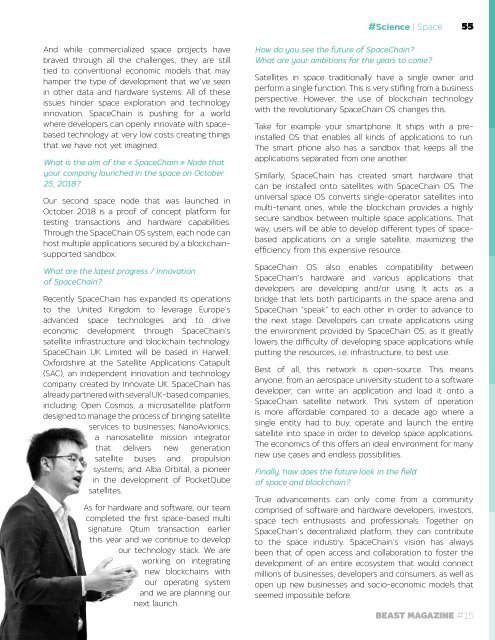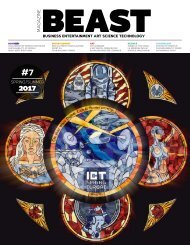Magazine BEAST #15 2019
Create successful ePaper yourself
Turn your PDF publications into a flip-book with our unique Google optimized e-Paper software.
#Science | Space<br />
55<br />
And while commercialized space projects have<br />
braved through all the challenges, they are still<br />
tied to conventional economic models that may<br />
hamper the type of development that we’ve seen<br />
in other data and hardware systems. All of these<br />
issues hinder space exploration and technology<br />
innovation. SpaceChain is pushing for a world<br />
where developers can openly innovate with spacebased<br />
technology at very low costs creating things<br />
that we have not yet imagined.<br />
What is the aim of the « SpaceChain » Node that<br />
your company launched in the space on October<br />
25, 2018?<br />
Our second space node that was launched in<br />
October 2018 is a proof of concept platform for<br />
testing transactions and hardware capabilities.<br />
Through the SpaceChain OS system, each node can<br />
host multiple applications secured by a blockchainsupported<br />
sandbox.<br />
What are the latest progress / innovation<br />
of SpaceChain?<br />
Recently SpaceChain has expanded its operations<br />
to the United Kingdom to leverage Europe’s<br />
advanced space technologies and to drive<br />
economic development through SpaceChain’s<br />
satellite infrastructure and blockchain technology.<br />
SpaceChain UK Limited will be based in Harwell,<br />
Oxfordshire at the Satellite Applications Catapult<br />
(SAC), an independent innovation and technology<br />
company created by Innovate UK. SpaceChain has<br />
already partnered with several UK-based companies,<br />
including: Open Cosmos, a microsatellite platform<br />
designed to manage the process of bringing satellite<br />
services to businesses; NanoAvionics,<br />
a nanosatellite mission integrator<br />
that delivers new generation<br />
satellite buses and propulsion<br />
systems; and Alba Orbital, a pioneer<br />
in the development of PocketQube<br />
satellites.<br />
As for hardware and software, our team<br />
completed the first space-based multi<br />
signature Qtum transaction earlier<br />
this year and we continue to develop<br />
our technology stack. We are<br />
working on integrating<br />
new blockchains with<br />
our operating system<br />
and we are planning our<br />
next launch.<br />
How do you see the future of SpaceChain?<br />
What are your ambitions for the years to come?<br />
Satellites in space traditionally have a single owner and<br />
perform a single function. This is very stifling from a business<br />
perspective. However, the use of blockchain technology<br />
with the revolutionary SpaceChain OS changes this.<br />
Take for example your smartphone. It ships with a preinstalled<br />
OS that enables all kinds of applications to run.<br />
The smart phone also has a sandbox that keeps all the<br />
applications separated from one another.<br />
Similarly, SpaceChain has created smart hardware that<br />
can be installed onto satellites with SpaceChain OS. The<br />
universal space OS converts single-operator satellites into<br />
multi-tenant ones, while the blockchain provides a highly<br />
secure sandbox between multiple space applications. That<br />
way, users will be able to develop different types of spacebased<br />
applications on a single satellite, maximizing the<br />
efficiency from this expensive resource.<br />
SpaceChain OS also enables compatibility between<br />
SpaceChain’s hardware and various applications that<br />
developers are developing and/or using. It acts as a<br />
bridge that lets both participants in the space arena and<br />
SpaceChain “speak” to each other in order to advance to<br />
the next stage. Developers can create applications using<br />
the environment provided by SpaceChain OS, as it greatly<br />
lowers the difficulty of developing space applications while<br />
putting the resources, i.e. infrastructure, to best use.<br />
Best of all, this network is open-source. This means<br />
anyone, from an aerospace university student to a software<br />
developer, can write an application and load it onto a<br />
SpaceChain satellite network. This system of operation<br />
is more affordable compared to a decade ago where a<br />
single entity had to buy, operate and launch the entire<br />
satellite into space in order to develop space applications.<br />
The economics of this offers an ideal environment for many<br />
new use cases and endless possibilities.<br />
Finally, how does the future look in the field<br />
of space and blockchain?<br />
True advancements can only come from a community<br />
comprised of software and hardware developers, investors,<br />
space tech enthusiasts and professionals. Together on<br />
SpaceChain’s decentralized platform, they can contribute<br />
to the space industry. SpaceChain’s vision has always<br />
been that of open access and collaboration to foster the<br />
development of an entire ecosystem that would connect<br />
millions of businesses, developers and consumers, as well as<br />
open up new businesses and socio-economic models that<br />
seemed impossible before.<br />
<strong>BEAST</strong> MAGAZINE <strong>#15</strong>

















